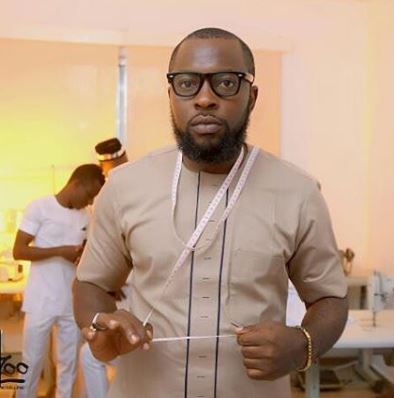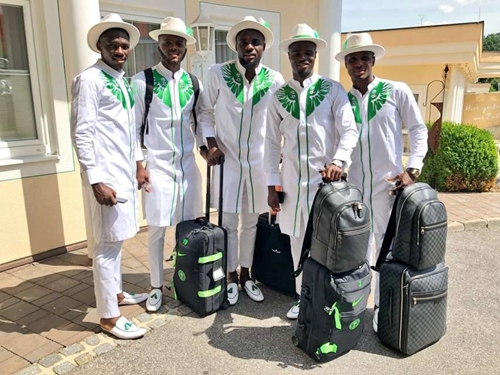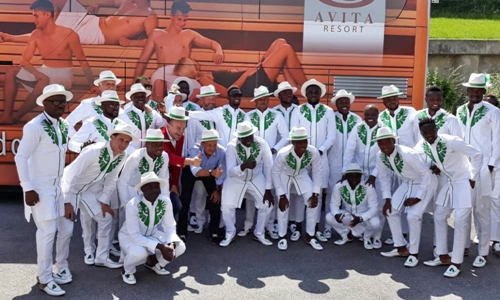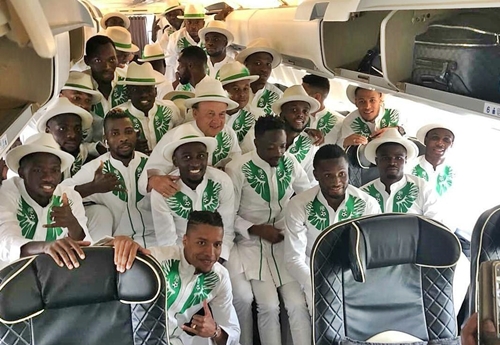A Warri, Delta State-based fashion designer who designed the impressive and customized native attire worn by the Super Eagles to Russia for the World Cup has spoken out on why he is not being recognized.

Esimaje Awani
Esimaje Awani, the Nigerian-Canadian fashion designer who produced the ‘Buba’ and ‘Sokoto’ worn by the Super Eagles to Russia for the 2018 World Cup, has expressed dissatisfaction for lack of credits for designing the outfits and for Nigerian media not celebrating his designs as they celebrated Nike’s jersey’s design.
The CEO of GT Stitches, who is the designer of the Super Eagles traditional wear that cemented their ‘Best Fashion Team’ award, specialises in making male and female caftans and his outfits has earned the Super Eagles rating as “The team with the best traveling uniform” in Russia by the British Broadcasting Corporation (BBC).
While speaking with Daily Sun, in a phone interview on Tuesday, Awani who is a Warri, Delta State-based designer and the maker of white outfit finished with green neck embroidery design for Super Eagles players said he feels under-appreciated by Nigerians.

He said: “It was actually a surprise when I saw the advert of the design on different blogs and newspapers even television stations without giving credits to me. If not for MITV that came to grant me interview on Saturday, nobody knew I was actually the designer of the Super Eagles’ dress”.
Expressing dissatisfaction over how low Nigerians rate Nigerian products, Awani said: “I think the problem we are having in this country is that we are having it very difficult to appreciate what is made in Nigeria.
“In Nigeria, we are engulfed with mentality of celebrating what is made abroad. The only reason Nike is having edge over Nigerians designs is because Nigerians prefer foreign products than local ones.
“If I were from America or UK, I would have been celebrated more than this. We need to start celebrating our own things and that is how we can industrialise our nation.

“Our local content is there as a law and the government has implemented it but what we need to do now is changing our behaviours and mindsets towards appreciating Nigerian goods”, he stated.
Speaking on what prompted his initiative to designed the dress, Awani said: “I’m a designer before now but Super Eagles’ design is borne out of love and passion for Nigeria because as a citizen of Nigeria, I have too much confidence in this country believing that only this country’s citizens that can move this country from point A to B.
“Immediately after the qualification of Super Eagles for World Cup competition, I think our last match with Algeria, as a designer, I felt it would be right for me to contribute my own quota to the entire project of going to Russia.
“That was then I sat down with my team and decided to create something that can actually enhance the confidence of our players.
“And at the same time to create jobs for Nigerian youths because the target of our company is to contribute our own quotas towards eradication of unemployment from Nigeria as well to establish our brand.

“So, this design was actually borne out of love and patriotism for Nigeria and that took me so much to create because it’s not a ready made design but created from the scratch”.
Awani, the designer of Super Eagles’ Aso Ebi attire that had earned the football team an international reputation also spoke on why Nigerians must patronise local made designs.
He said, “As local designers in Nigeria, we are putting in our best to see that we can create something that can compete with our international counterparts. But what you need to understand in fashion business is that, it is patronage that can place you on top other brands.
“So as I said earlier, our people need to cultivate mindset of appreciating our brands over international brands because we are doing well and you can agree with me that the kind of clothes we do have to do with our own culture and that is the most important thing.
“This is our culture and everything we do has connection with our culture especially in designing clothes in Nigeria and Africa generally,” Awani said.

